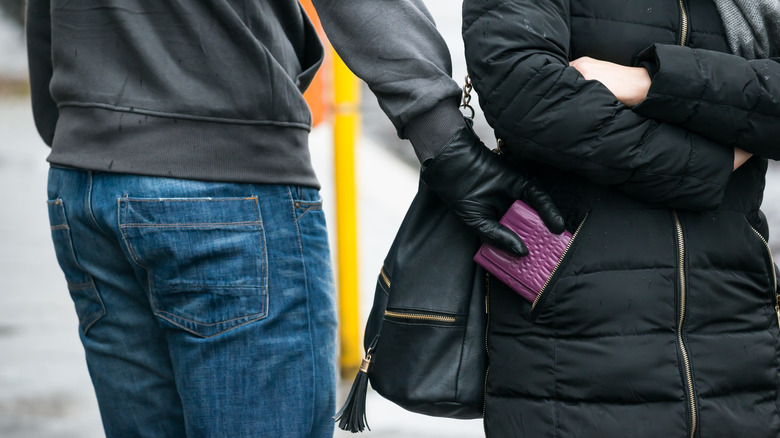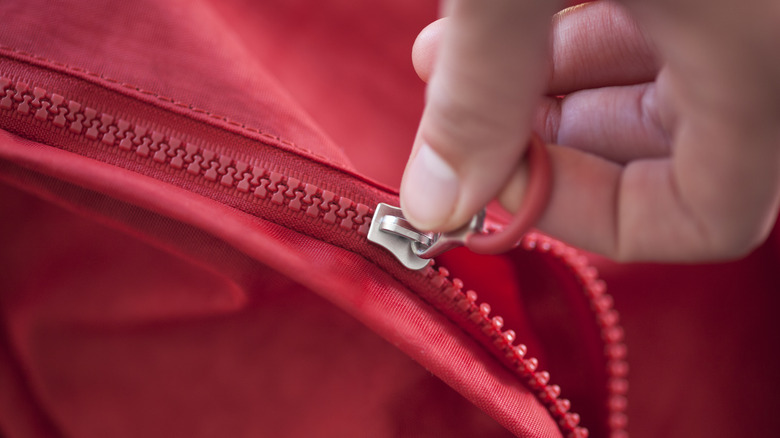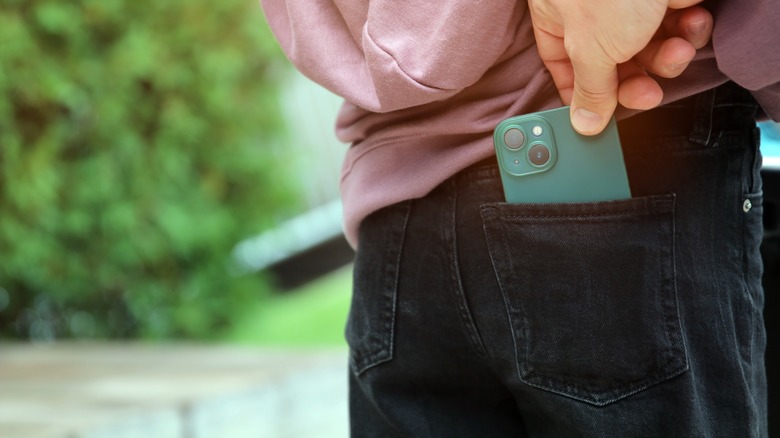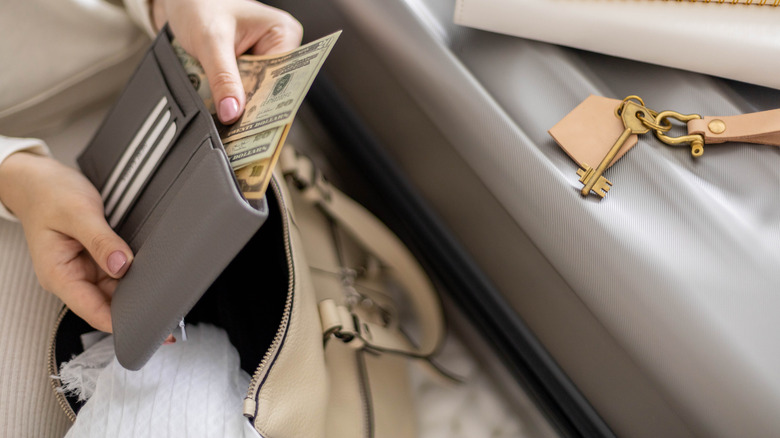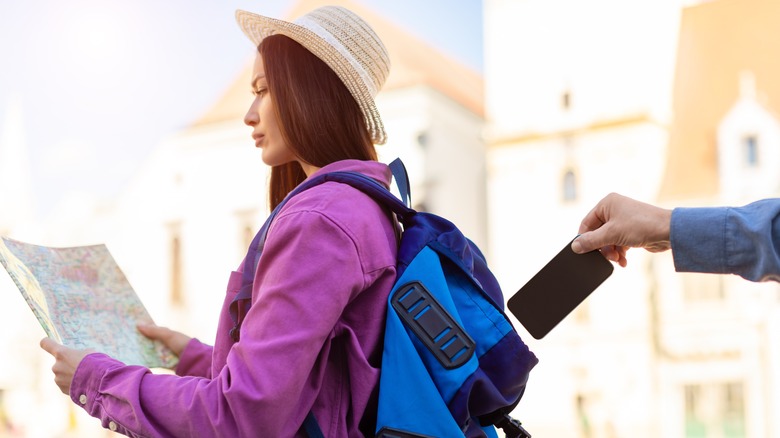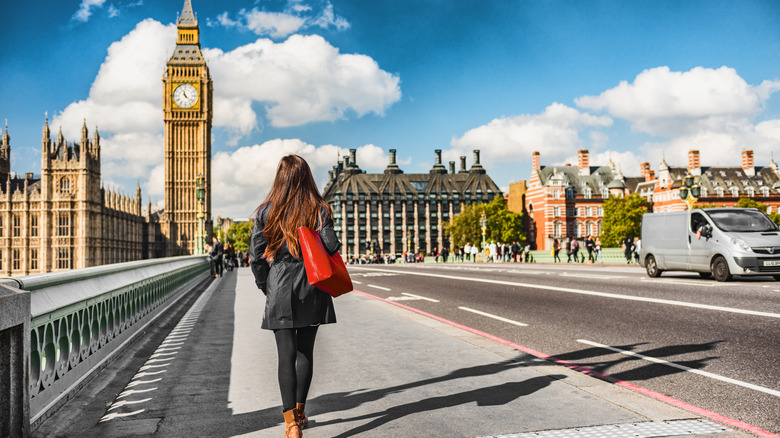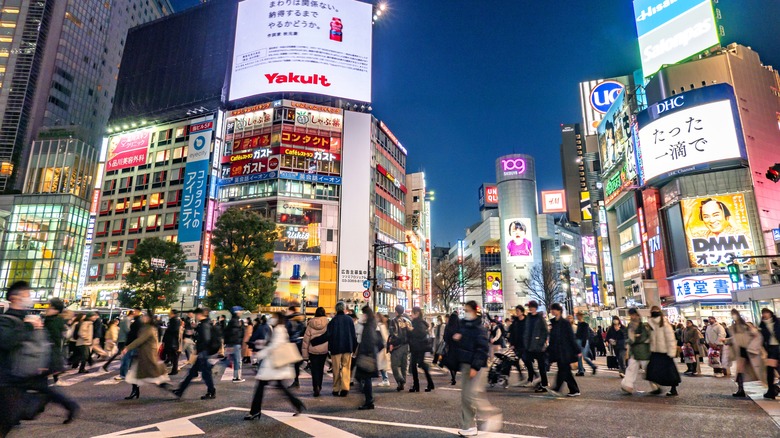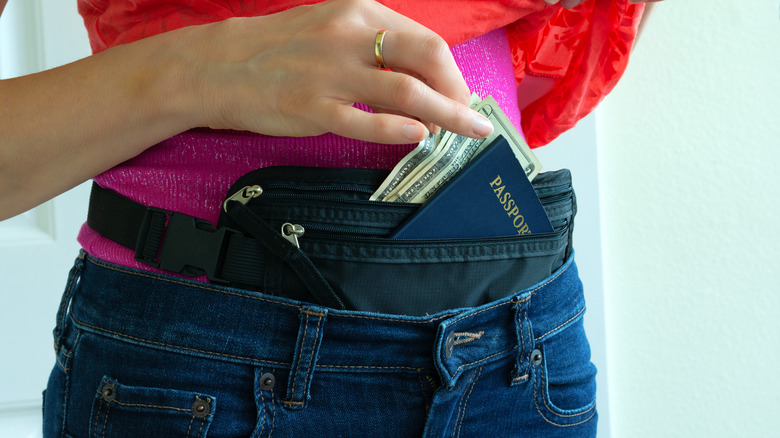10 Hacks That Will Protect You From Pickpockets While Traveling
Going on vacation is liberating and joyous. It lets you see new places, enjoy fresh experiences, and discover new things. You can also unwind as you immerse yourself in a foreign environment. And while this is perfectly natural — and very much the point of taking a pleasure trip — it's also fraught with danger. Pickpockets know to strike when travelers switch off and slip into that contented vacation mindset. Whether at a stunning snorkeling destination in the U.S., sliding into the water for a quick swim, or standing in line for a sweet treat at a Parisian tourist trap, losing your sense of the people and space around you can lead to disaster.
Having one's valuables stolen is a harrowing experience at the best of times, but that sense of loss gets amplified when on a trip to an unfamiliar place. And pickpocketing has grown more commonplace than many people realize. According to insurance company Quotezone.co.uk, for every million visitors to some of Europe's most famed cities, hundreds have their items pilfered. These numbers might seem paltry, but the effects can be far-reaching, especially if you're the victim. Pickpockets can relieve you of your belongings in multiple ways, from slickly choreographed distractions to brazen, straight-up grabs. However, taking a few measures to minimize your risk will help you avoid a harrowing run-in with a thief.
1. Dress down
It's a pretty obvious statement, but one worth mentioning nonetheless: glam and glitz draw the eye. That may be why celebrity gossip has become such successful tabloid and internet fodder. The same goes for a pickpocket drawn to a mark. Seeing a flashily dressed tourist who exudes a sense of opulence and money will quickly attract a thief. Some clothing mistakes also quickly identify you as a tourist.
A better choice? Dress every day — think Normcore instead of sharp shirts or fancy summer dresses. You don't have to wear faded or tattered items, but dressing in a way that doesn't draw extra attention is a simple method for making sure you don't stick out in a crowd. "No fake nails. No golf visors. No khakis," Louise Lague, editor of the "Expat Almanac," a guide for international travelers, advised The Seattle Times. "No fleece. Labels like Columbia and North Face are a dead giveaway."
Another smart option is to wear anti-theft clothing, like that designed by Bluffworks. The company has comfortable pieces with hidden pockets that look stylish, though not glamorous. For instance, it offers a chino featuring a total of 10 pockets — some zippered (and hence less easy to access), and some designed to hold a phone without being obvious. Such garments are invaluable when trying to look like you have nothing to steal; after all, a pickpocket is less likely to pursue a tourist who seems as though they have little to offer.
2. Use bags with zips, not clasps or flaps
A clear way tourists stand out from locals is the sheer volume of things they carry. In practice, this means backpacks, souvenir bags, totes, and more. Locals might go about their daily business with minimal items — many won't have a backpack or little more than a small purse. Walking around without any extras will help you blend in. However, travelers usually need to have at least one bag with them when out and about.
If you opt to bring a bag or purse, avoid options that use clasps, clips, or flaps as a closing mechanism, as they are easy for pickpockets to speedily unbuckle. "There are bags that pickpockets and opportunists will specialize in and love to go after and the easiest one is an open tote bag," travel skills trainer Kevin Coffey told CNN. "That's easy to get your hand into. So, you'll want to look for a product that's going to be zippered and, better yet, has some type of locking mechanism."
A savvy alternative is an anti-theft bag, like those made by Pacsafe with unslashable materials — cutting open bags in crowded areas is a common tactic used by thieves to access what's inside. Anti-theft bags also incorporate security clip systems that make them simple to attach to objects like chairs and tables, which is crucial when relaxing at a streetside cafe (where opportunistic bag snatching is easy). They also have lockable zippers that provide an added layer of security.
3. Place your phone and wallet out of sight
Seeing people in their home neighborhoods walking down the street with their phones and wallets in their back pockets is a common occurrence. They'll do this because they feel comfortable in their surroundings, know how to read social cues and signals around them, and encounter plenty of others doing the same thing. Despite this, your back pocket isn't the best place to put a wallet or phone at any time — you can't even see them after all. Storing them there may also come with health risks, such as back issues and exposure to increased radiation. However, on vacation, the habit is troubling for a different reason.
While traveling, you will have less intuitive knowledge of the surrounding dynamics. You will need to concentrate on details like where to go and how to act in a new place — all tasks that take your attention away from your personal belongings and make you an easier target. A wallet or phone bulging out of your back pocket clearly indicates that you have something to steal. A much safer choice is to put these objects out of sight. You could use clothing that hides your important belongings (a phone, while an everyday item in most people's lives, is still extremely valuable, as it's filled with personal and financial information) or bags that make them difficult to access.
4. Purchase a crossbody phone case
With the ever-growing prevalence of cashless transactions and the rapid rise of virtual payment apps, phones have become more than just a communication device. For many travelers, their phone is their life. Sure, first and foremost, it's a way of keeping in touch with friends and family, but it's so much more. Phones are conduits through which we keep ourselves entertained, learn about the world, take and store photos and memories, assemble all our contacts (who hasn't lost a phone and felt like they could no longer get in touch with anyone?), and pay for items.
With so much at stake, isn't it paramount to keep your phone — perhaps more than everything else except your passport — as secure as possible? One simple, low-tech method for achieving this is purchasing a crossbody phone case with a chain or strap. Brands like Casebus manufacture standard phone cases as well as crossbody ones that you can wear on your torso, making it hard for prospective thieves to separate them from you. The cases in this range vary in capacity and look, with some simply designed to carry a phone and little else. Meanwhile, others function as full-fledged wallets capable of stashing all your cash and cards. The chains and straps on the cases are detachable — but not easily, which would make them attractive to a pickpocket.
5. Separate your money
While cashless payments are more commonplace than ever, carrying cash is still important. Some places only take payment in bills and coins, and others charge extra for cashless payments, so it's a smart choice to carry some liquid assets around with you. However, cash is also easy to spend — it doesn't require identification to use, it's impossible to cancel, and there is no way to trace your bills once they get stolen. The key to not losing all your money if you are pickpocketed is to spread it around your person. "We tell our clients to divide their credit cards and cash into separate pouches or hiding places," Danielle Kunkle of Boomer Benefits shared with Forbes. "If a theft occurs, you are not stranded without access to any funds."
Stow some cash in a wallet, in an inside pocket (be sure to empty all your pockets when you put your clothes in the wash — it's easy to forget about a few crumpled bills), and even in your shoe, preferably wrapped in plastic. A decoy wallet that has none of your credit or debit cards but a little cash in it is a good idea. Place it in a prominent position that might draw the eye of a pickpocket, making it an obvious target. Sure, you'll lose a little dough, but that will be nothing compared to losing everything if you put all your money in one place.
6. Avoid backpacks
Many tourists tend to carry backpacks, an especially common approach for anyone traveling with a group or family that plans to be out for the day. A backpack is extremely handy, as it is spacious enough to load up supplies for a long outing. You can fit in water bottles, caps, sunglasses, snacks, a guidebook, and the all-important sunblock. The problem is that nothing quite screams "vacationer" more than a backpack bulging to its limits that is wider front to back than the person carrying it. Thus, you should always think twice before traveling with a backpack.
The most worrying aspect of backpacks is evident in the name — people carry them on their backs where it's impossible to keep an eye on them. They also make you stand out on the street, on public transport, at a tourist site, and in a store. A full backpack suggests the presence of several items; whether any of it has value may be unknown to a pickpocket, but that certainly won't put them off trying to find out. A better choice is to use smaller, more slender bags that are easier to manage and less of a magnet for thieves. If you still insist on using a backpack on your travels, make it a frontpack and wear it on your chest where you can watch it. You should also keep it tethered whenever you sit in a public place.
7. Walk against traffic
A low-tech way pickpockets get your items is the classic snatch-and-grab. Historically, thieves on foot would grab your bag, purse, phone, or wallet and then run away as fast as they could, hoping you wouldn't give chase to apprehend them. A more efficient approach is for a rider (or passenger) on a bike or scooter to drive by, grab your valuables, and then speed off. Look around, and you can see why this method is so popular — people often walk down the road looking at their phones, oblivious to their surroundings. Think about how easy it would be to snatch one of those phones and disappear with it on a scooter or bicycle.
These types of thefts are hard to stop when the rider approaches the victim from behind. A simple fix is to walk against the traffic so that you can always see who is coming. It's not always possible to pull off, especially on a one-way street, but do it when you can. Pay attention when you wander down a street — thieves don't expect you to be on high alert (you are on vacation, after all, and are supposed to be relaxing) — and take note of bikes and scooters that approach. If you have a sling bag or purse, always wear it on the side of your body facing away from the traffic to make it trickier for a rider to grab.
8. Be wary of strangers willing to help you
One of the fondest memories of any trip can be the interactions you have with the locals. Sometimes, seeing a renowned tourist site can take a back seat compared to a friendly conversation with a resident. While the vast majority of people you will encounter are likely decent and law-abiding, some have an overriding desire to separate you from your belongings. And they might do this in an unexpectedly disarming way by being friendly.
You might have trouble navigating the subway system in a foreign city: perhaps purchasing a ticket is not easy to parse, and suddenly, a stranger steps in and offers to help. Or you are having trouble carrying your suitcase up a set of stairs, and a gallant youngster springs to your aid. Maybe the ATM you are using is giving you a hard time, and a bystander who uses it regularly offers to show you what you are doing wrong.
In each of these scenarios, you can quickly lose your valuables. The metro helper might fleece you of money, the suitcase-carrying individual can run off with your baggage, and the ATM attendant might be part of an elaborate ruse to pilfer your account details. It's also entirely possible that all of these people intend to genuinely help you, but how can you make that call effectively when in an unfamiliar place?
9. Stay away from crowds
If you plan to visit popular tourist attractions on vacation, it will be impossible to avoid crowds. The truth is, when jammed in between people, it's easy for thieves to reach into your bag or pockets without you realizing it. Someone could bump you from the front, diverting your attention, while an accomplice slides their hand into your back pocket or backpack while you remain blissfully unaware. When there are crowds, there will always be jostling and brushing of bodies and bags; in those instances, it's hard to tell when someone is doing something nefarious. "Crowds anywhere, but especially on public transit and at flea markets, provide bad guys with plenty of targets, opportunities, and easy escape routes," warned travel expert Rick Steves on his website.
The most straightforward solution is to keep away from large crowds whenever possible. Think about visiting a tourist site at a less busy hour or skipping the tourist traps altogether. When walking around the city, choose routes that aren't major thoroughfares and favor back roads and alleys instead (though this can come with its own theft risks). Consider taking public transport outside of rush-hour windows when the subways and buses are likely to be chock-full of people. If none of these approaches are feasible and you find yourself repeatedly drawn to places with crowds, practice measures like wearing smart clothing, choosing appropriate bags, and slinging a backpack in front of you.
10. Get a pouch that sits under clothing or a slim belt bag
A simple rule to help you avoid getting robbed is to think like a pickpocket. If you walk past someone and can't tell from a quick scan whether they have anything of value on them, then chances are they won't be an easy target. Pickpockets aren't people who generally study their victims in detail; they are more opportunistic, seeing a weakness in the victim's security and quickly taking action. If you don't seem to have any valuables that are easily accessible, the thieves might just give up trying to steal from you and quickly move on to the next mark.
One way to avoid their beady gaze is by following this TikTok clothing hack and hiding your valuables under your clothing, especially in big cities. This not only shields the items away from prying eyes but also makes them hard to get to. Many companies sell wallets and money belts that sit snugly below your clothing and can hold cash, passports, and cards. You can wear them around your waist like a belt or neck like a giant necklace — both approaches are effective. For zippered pouches, the zip usually faces outward, but think about flipping the bag around so the zip faces inward for extra protection. It's a simple fix for a potentially devastating problem.
